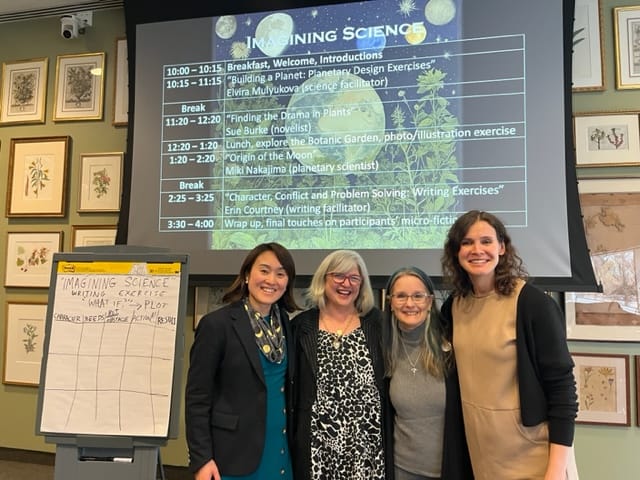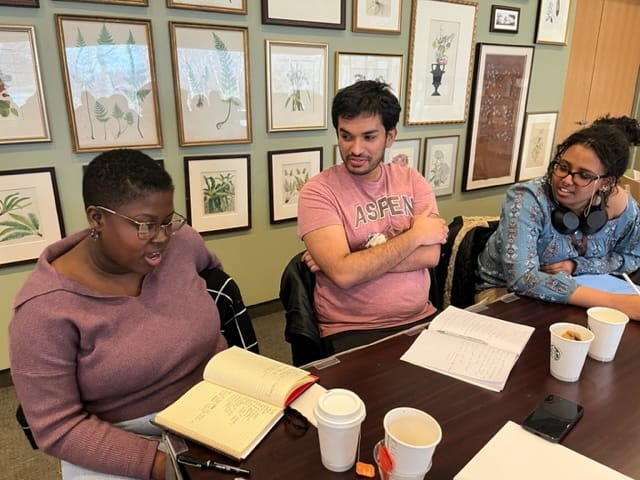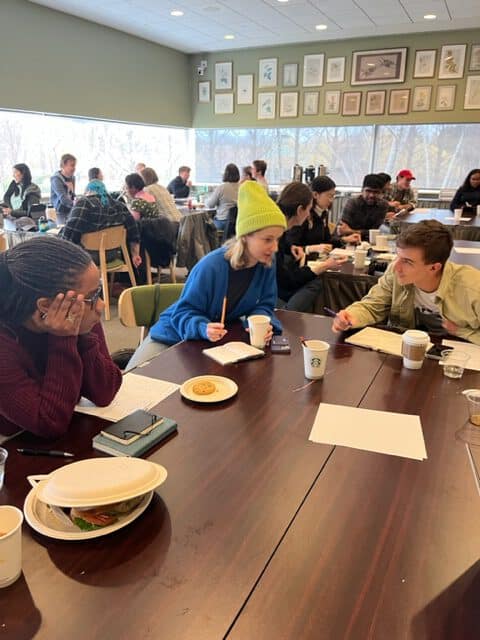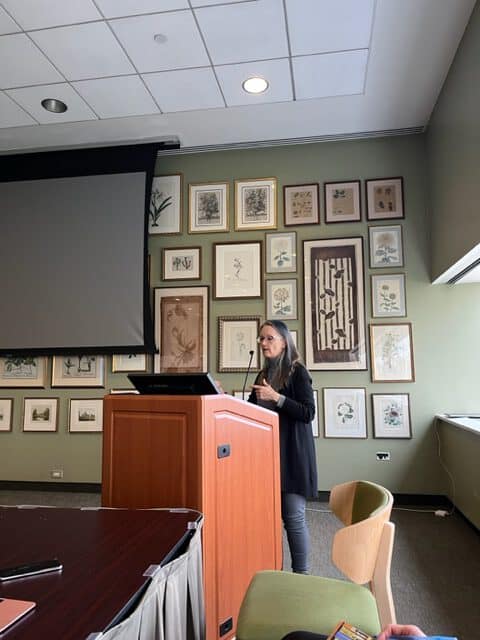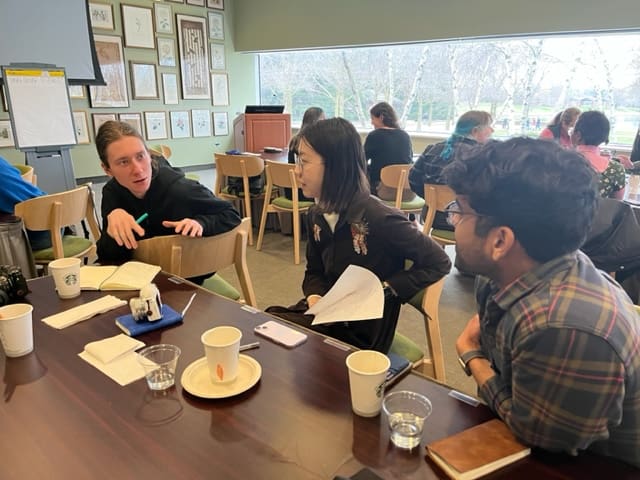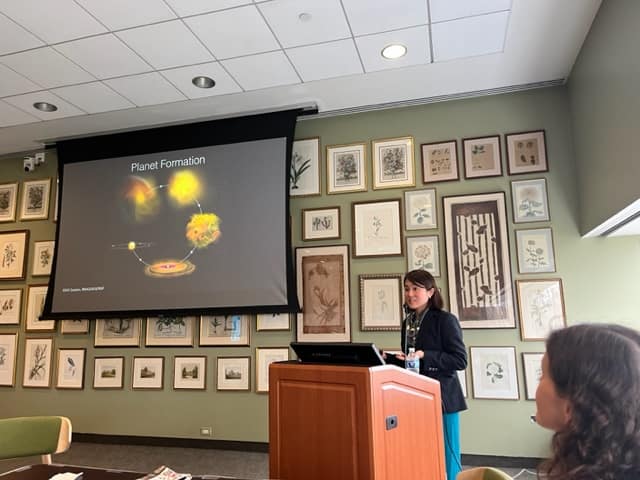On March 30th, 2024, 10am – 4pm, the “Imagining Science” Workshop took place in Chicago Botanic Garden, organized by Elvira Mulyukova (Asst. Professor at the Department of Earth and Planetary Sciences) and Erin Courtney (Professor at the Department of Radio, Television, and Film). The event was funded by Northwestern Institute on Complex Systems, as part of the Complex Challenges for a Complex Future program, and we specifically focused on science education, writing, and creativity.
The workshop brought together scientists, science fiction writers, and an academically diverse group of students and faculty to practice imagining things way bigger than our everyday lives. To come up with big, visionary ideas requires imagination and good information. Writing science fiction while carefully accounting for the real science is an impactful way to do just that. By the end of the day, each participant had written a short sci-fi piece: from generating an idea, to supporting it with accurate information, to getting it on paper.
The attendees learned the fundamentals of Earth and Planetary Sciences (taught by Elvira Mulyukova), and the fundamentals of writing scientific fiction (taught by Erin Courtney). The workshop featured invited presentations by Asst. Professor from Rochester University Miki Nakajima on the “Origin of the Moon”, a science-fiction novelist Sue Burke on “Finding the drama in plants”, and creative assignments facilitated by Northwestern faculty Elvira Mulyukova and Erin Courtney.
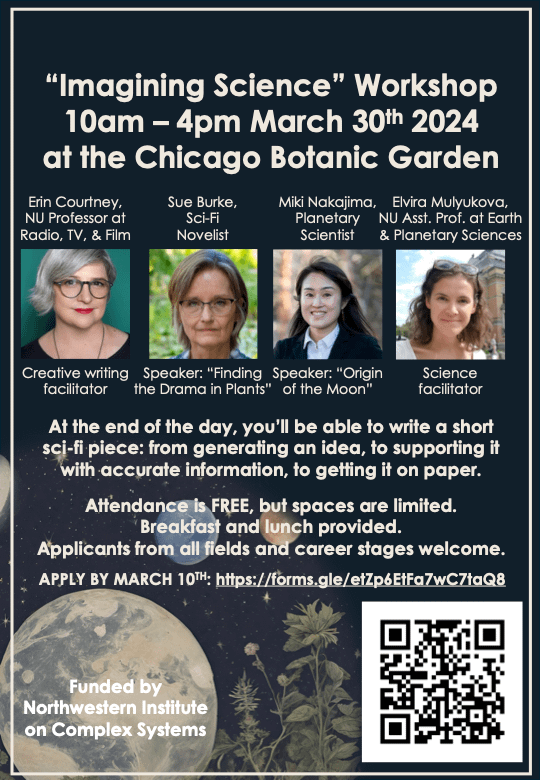
Stats
- 4 faculty, 16 PhD students, and 10 undergrads
- Represented Departments: Computer Science, Physics and Astronomy, Radio-TV-and-Film, Media-Technology-and-Society, Engineering Sciences and Applied Mathematics, Earth and Planetary Sciences, Chemical and Biological Engineering, Technology and Social Behavior
Outcomes
Some of the themes explored in these essays include: people’s impact on the environment through environment’s point of view; imagining a different world inhabited by people like us (with similar feelings, relationships between parents and children, romantic partners, etc.); impenetrable natural boundaries (a wall of poison in the ocean, rocky walls on land); an authority who knows more than most but won’t explain it (creatures with additional senses, adults relative to children, secret labs, elite groups, officials/bureaucrats); diminishing resources (not just for humans and not just on Earth); being the one staying behind when new worlds are explored; new forms of interconnectedness/coupling with the environment (e.g., through tree roots); new technology triggering moral dilemmas; our place in the (unintuitively large, long-lived) universe; point of view that isn’t a human, etc.
As for takeaways from the organizers point of view, Elvira Mulyukova was surprised by the strong emotional component of the essays. She speculates that part of the reason is that that’s what people know well from the outset (compared to newly learned science), and therefore find it easier to write about, especially in a limited amount of time. It would be useful to leverage that in future writing events, while maintaining the goals of acquiring new knowledge and imagining the unknown. Similarly, many writings reflected known/typical avenues of science fiction, including technological developments, space travel, aliens, etc. This likely also exemplifies that people tend to imagine and write about things that they already know. Going forward, she suggests limiting the range of choices that the participants have to make when imagining the unknown or the unintuitive, e.g., by picking a specific time, world, or being. Having too many choices makes the participants gravitate towards what they already know (emotions and/or typical sci fi topics). It is, however, worth emphasizing that many of the topics explored in the essays were highly original and tightly linked with the themes of the workshop.
Erin Courtney notes that a major take away for her as writer and writing teacher is the way in which the participants were able to integrate a hard science problem into their narratives, and how this problem was intertwined with a character size problem.
Speakers
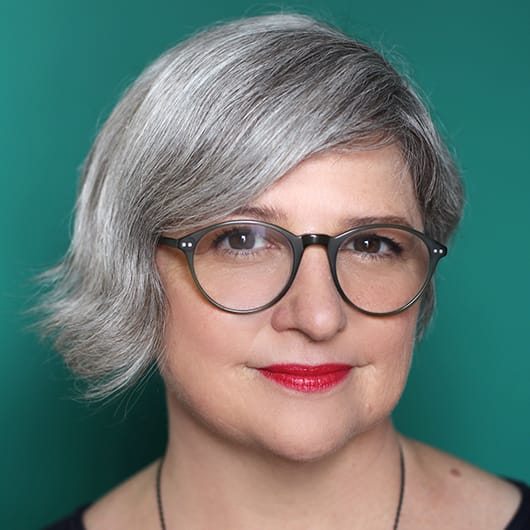
Erin Courtney
Erin Courtney is an award winning playwright and visual artist. Her 13P play, A Map of Virtue, directed by Ken Rus Schmoll, was awarded an Obie and described as “one of the most terrifying plays of the past decade” by Alexis Soloski in The New York Times. The musical, The Tattooed Lady, which she co-wrote with composer and lyricist, Max Vernon, premiered at The Philadelphia Theatre Company in 2022. She has written two operas with Elizabeth Swados: The Nomad and Kaspar Hauser, commissioned and produced by The Flea Theater. Ms. Courtney earned her MFA in playwriting at Brooklyn College and her BA from Brown University. An alumnus of New Dramatists, MacDowell, the Playwrights’ Center, and The Working Farm at Space on Ryder Farm. She was awarded a Guggenheim Fellowship in 2013. Ms. Courtney is core faculty in the MFA Program of Dramatic Writing at Northwestern University in the Radio/Television/Film Department.
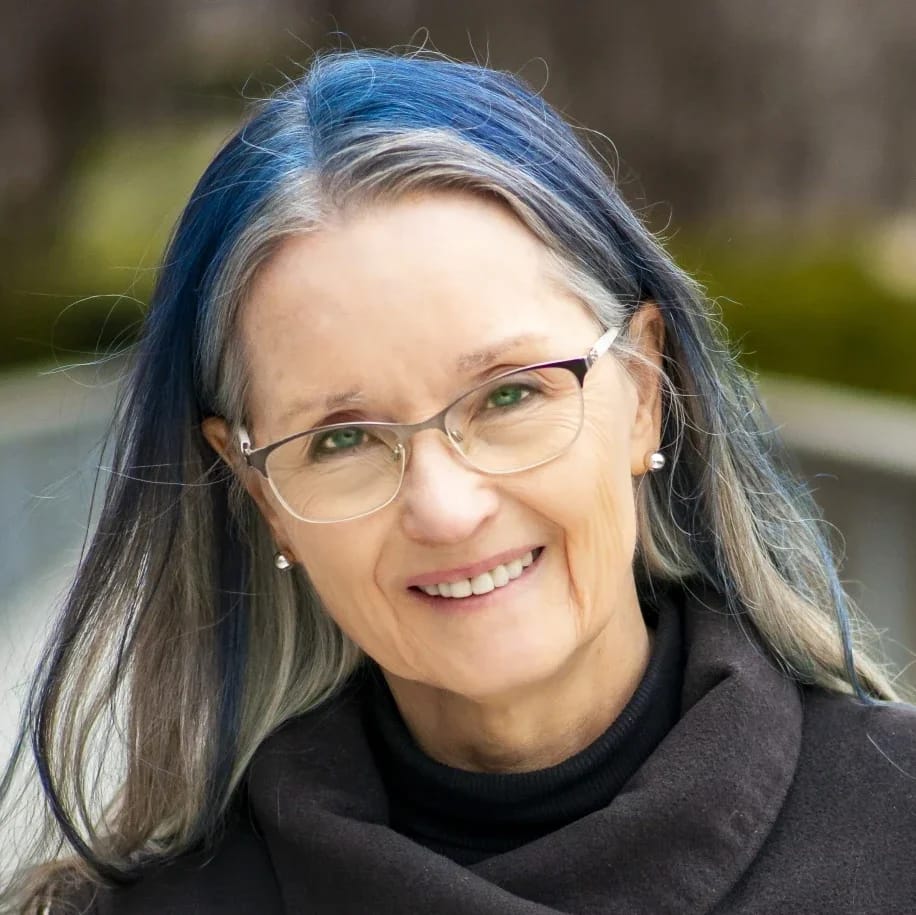
Sue Burke
Sue Burke is an author and translator. Her novel Semiosis, which imagined a planet where plants are intelligent, was nominated for the Arthur C. Clarke Award, John W. Campbell Memorial Award, and the Locus Best First Novel Award. Its sequels are Interference and Usurpation (to be published in October 2024). She has also written short stories, poetry, journalism, and essays, and she won the 2016 Alicia Gordon Award for Word Artistry in Translation from the American Translators Association. She currently lives in Chicago, Illinois. More information is at
https://sueburke.site/
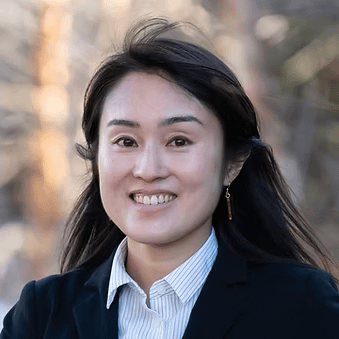
Miki Nakajima
Dr. Miki Nakajima grew up in Tokyo in Japan and received her B.S. and M.S. degrees at the Tokyo Institute of Technology. She moved to the United States and received her Ph.D. at the California Institute of Technology in Planetary Science in 2016. After several years of a postdoctoral fellowship at the Carnegie Institution for Science in Washington DC, she started her current position, an assistant professorship at the University of Rochester in 2018. Her research interests focus on planet formation and evolution based on theory, numerical simulations, and shock experiments. More information is at
https://www.mikinakajima.com/
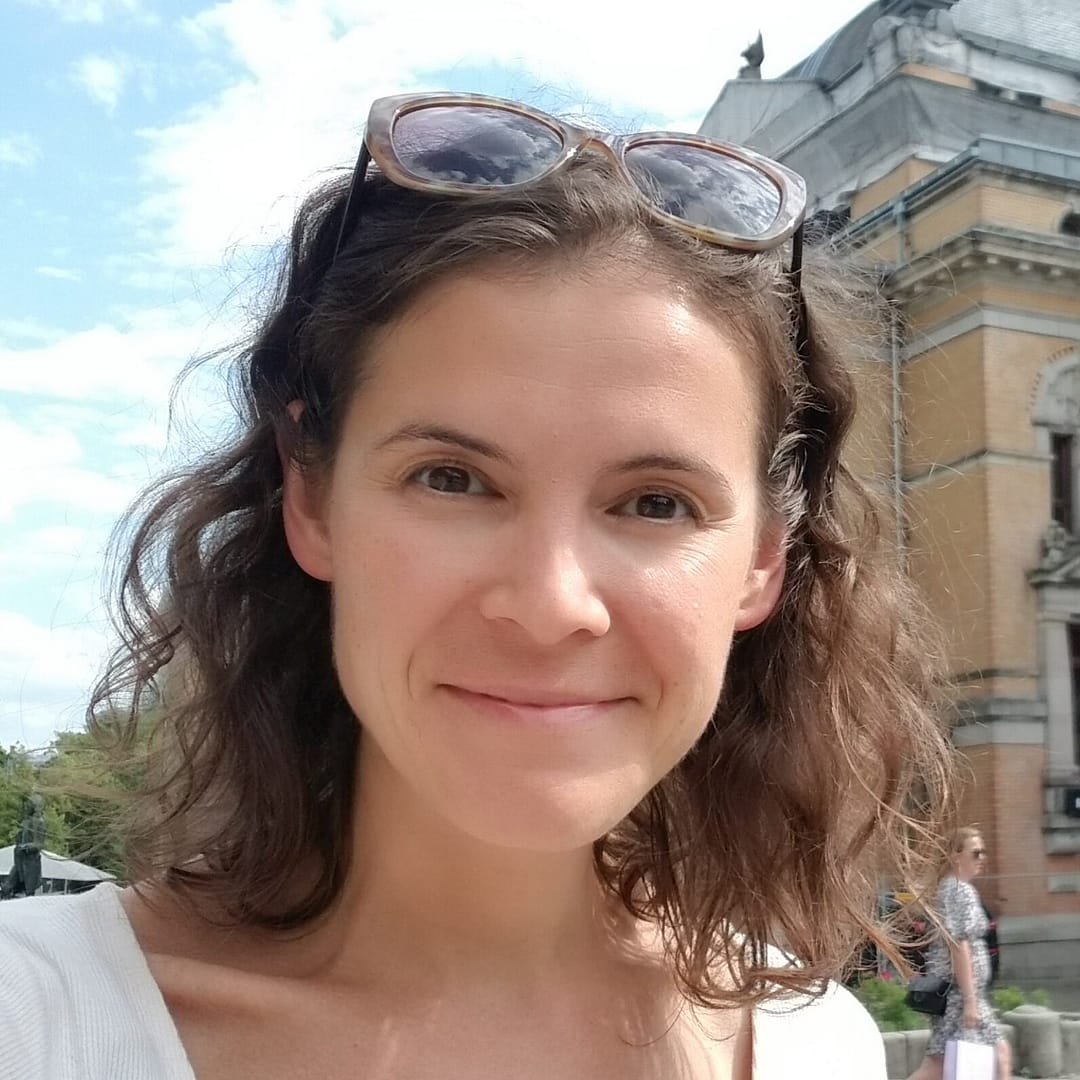
Elvira Mulyukova
Elvira Mulyukova is an assistant professor in the Department of Earth and Planetary Sciences at Weinberg College of Arts & Sciences, Northwestern University. Her research aims at understanding the physical processes that govern evolution of terrestrial planets, ranging from the atomic scale physics of mineral grains to the planetary scale of mantle flow. She uses mathematical methods to develop physically consistent models of rock mechanics and incorporates them into larger scale geodynamic models of plate tectonics, earthquake cycles, and other geological processes that shape the history and the future of rocky planets. She received her Ph.D. at University of Potsdam, based on the work done at GFZ German Research Centre for Geosciences, completed a 2-year postdoctoral scholarship at Yale University, where she stayed for 4 more years as a Research Scientist, and joined The Northwestern University in 2021.
Gallery
